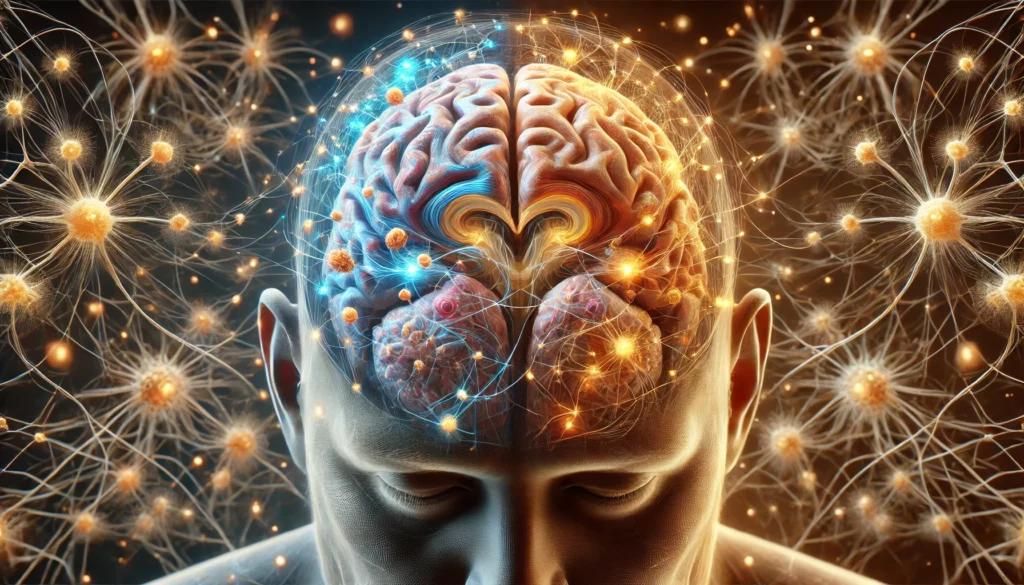
The cholinergic system is one of the most important neurotransmitter systems in the human brain. It is based on the neurotransmitter acetylcholine, which plays a central role in memory, learning, attention, sleep regulation, and emotional processing. While neurotransmitters such as dopamine, serotonin, and norepinephrine are often the primary focus of research on bipolar and unipolar disorders, imbalances in the cholinergic system are increasingly gaining attention in scientific studies.
But what exactly is the role of the cholinergic system in the development and treatment of these mental health conditions?
🧠 The Function of the Cholinergic System in the Brain
✔ Cognition & Memory – Acetylcholine is essential for learning, concentration, and memory retention.
✔ Sleep-Wake Regulation – It controls REM sleep and helps balance wakefulness and rest.
✔ Emotional Stability – Acetylcholine interacts with other neurotransmitters such as dopamine and serotonin to regulate mood.
✔ Attention & Sensory Processing – It influences how external stimuli are perceived and processed.
📌 A disrupted cholinergic system can therefore lead to cognitive impairments, mood fluctuations, and sleep disturbances—all symptoms commonly found in bipolar and unipolar disorders.
🔄 The Cholinergic System in Bipolar and Unipolar Disorders
1. The Cholinergic System and Unipolar Depression
✔ Increased acetylcholine activity has been observed in depressive episodes, which may be associated with excessive rumination, lack of motivation, and emotional instability.
✔ REM sleep disturbances are a hallmark of depression—acetylcholine plays a critical role in regulating sleep cycles.
✔ Cortisol (the stress hormone) is regulated by acetylcholine—an imbalance could increase stress sensitivity.
📌 An overactive cholinergic system may exacerbate depressive symptoms, particularly in the form of excessive self-criticism, repetitive negative thinking, and cognitive difficulties.
2. The Cholinergic System and Bipolar Disorder
✔ Interaction with dopamine: A low acetylcholine level may contribute to increased energy, restlessness, and hyperactivity in manic episodes.
✔ Increased acetylcholine activity in depressive phases may intensify emotional lows.
✔ Altered sensory processing: Dysregulation could make individuals with bipolar disorder more sensitive to external stimuli during mania, while depressive phases may impair their ability to process their environment effectively.
📌 An imbalance between acetylcholine and other neurotransmitters may contribute to the extreme mood swings seen in bipolar disorder.
🛠 Therapeutic Approaches for Regulating the Cholinergic System
Since the cholinergic system is closely linked to cognition, sleep, and emotional stability, targeted treatment strategies could help alleviate symptoms in bipolar and unipolar disorders:
✔ Pharmacological Treatment:
- Anticholinergic Medications (e.g., tricyclic antidepressants, certain antipsychotics) → Reduce excessive acetylcholine activity and may alleviate depressive symptoms.
- Cholinesterase Inhibitors (Donepezil, Rivastigmine) → Increase acetylcholine levels, which could improve cognitive symptoms but remain controversial for bipolar disorder.
✔ Lifestyle & Dietary Strategies:
- Choline-Rich Diet (eggs, fish, nuts) → Supports acetylcholine balance.
- Maintaining a Regular Sleep Schedule → Helps regulate cholinergic system activity.
✔ Non-Pharmacological Therapy:
- Cognitive Behavioral Therapy (CBT) → Helps counteract negative thought patterns associated with cholinergic imbalances.
- Mindfulness & Meditation → Supports the regulation of acetylcholine and other neurotransmitters.
📌 While research on the targeted modulation of the cholinergic system is still ongoing, early findings suggest promising treatment approaches.
🎯 Conclusion: The Cholinergic System as a Key to Mood Stability?
✔ The cholinergic system plays a central role in cognition, sleep regulation, and emotional processing.
✔ In depression, excessive acetylcholine activity may worsen symptoms, while in mania, a deficiency may contribute to hyperactivity.
✔ An imbalance between acetylcholine and dopamine may influence mood swings in bipolar disorder.
✔ Future treatment approaches could target the cholinergic system to improve depressive and cognitive symptoms.
💡 While serotonin and dopamine remain the primary focus of research, the cholinergic system may be a crucial but underexplored factor in the treatment of bipolar and unipolar disorders. 💙